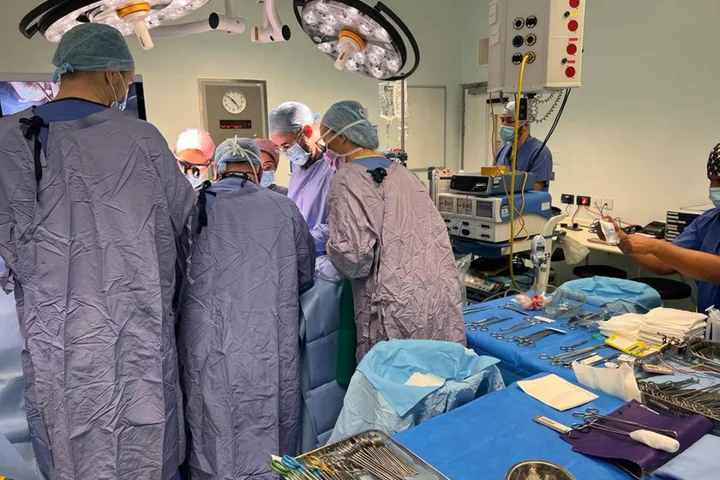
BYD, KG Mobility in talks on battery joint venture in South Korea -source
SEOUL China's BYD Co Ltd and South Korea's KG Mobility Co Ltd are in talks to jointly build
2023-08-23 18:46

Marketmind: 'Flash' business funk and AI buzz
A look at the day ahead in U.S. and global markets from Mike Dolan A combination of worrying August business
2023-08-23 18:24

Taking adult education classes may lower risk of dementia, study suggests
Taking an adult education class could help lower your risk of developing dementia, researchers have found. Middle-aged and senior citizens in adult education have a 19% reduced chance of developing the condition within five years, a new study suggests. The findings also suggest that people who took the classes kept up their fluid intelligence – the ability to reason quickly and to think abstractly – and non-verbal reasoning performance better than peers who did not. First author Dr Hikaru Takeuchi, of Tohoku University in Sendai, Japan, said: “Here we show that people who take adult education classes have a lower risk of developing dementia five years later. “Adult education is likewise associated with better preservation of non-verbal reasoning with increasing age.” Here we show that people who take adult education classes have a lower risk of developing dementia five years later Dr Hikaru Takeuchi, Tohoku University Dr Takeuchi and his co-author Dr Ryuta Kawashima, also a professor at the Institute of Development, Ageing and Cancer at the university, analysed data from 282,421 people in the UK Biobank, which holds genetic, health, and medical information from approximately half a million British volunteers, They had enrolled between 2006 and 2010, when they were between 40 and 69, and had been followed up for an average of seven years at the time of the new study. Based on their DNA, people were given an individual predictive risk score for dementia, and self-reported if they took any adult education classes, without specifying the frequency, subject, or academic level. The study looked at data from the enrolment visit and third assessment visit, between 2014 and 2018. Those enrolled in the study were given psychological and cognitive tests, for example for fluid intelligence, visuospatial memory and reaction time. According to the study published in Frontiers in Aging Neuroscience, 1.1% of people in the sample developed dementia over the course of the study. It also found that people who were taking part in adult education, at enrolment had 19% lower risk of developing dementia than participants who did not. The results were similar when people with a history of diabetes, high cholesterol, cardiovascular diseases, cancer or mental illness were excluded. The researchers suggest this means the observed lower risk was not exclusively due to people with developing dementia being prevented from following adult education by symptoms of these known conditions. Dr Kawashima said: “One possibility is that engaging in intellectual activities has positive results on the nervous system, which in turn may prevent dementia. “But ours is an observational longitudinal study, so if a direct causal relationship exists between adult education and a lower risk of dementia, it could be in either direction.” Read More Charity boss speaks out over ‘traumatic’ encounter with royal aide Ukraine war’s heaviest fight rages in east - follow live Indiyah Polack: I didn’t want to go on Love Island because of my acne Everything you need to know about the UK’s first womb transplant Why are wellbeing experts concerned about the ‘lazy girl job’ trend?
2023-08-23 17:59

Greek fires rage after migrant tragedy near border
The bodies of 18 males were found in a forest in northern Greece where fires have burned for days.
2023-08-23 17:47

'You can't take it off': Charlize Theron will no longer gain weight for movie roles
Charlize Theron will no longer undergo physical transformations for film roles after piling on the pounds for parts in 'Monster' and 'Tully'.
2023-08-23 17:29

Fukushima disaster: What happened at the nuclear plant?
A tsunami struck the Japanese plant in 2011, leading to the worst nuclear disaster since Chernobyl.
2023-08-23 16:27

Everything you need to know about the UK’s first womb transplant
The UK’s first womb transplant means that, in future, dozens of women born without a functioning organ can carry babies of their own. – What has happened? Surgeons have performed the UK’s first womb transplant on a 34-year-old woman whose older sister donated the organ to her. In a complex procedure, the medical team removed the womb from the 40-year-old woman and implanted it directly into her sister. Both women have made a good recovery. – Have any babies been born? Not yet. Experts want to be sure the transplant is stable and the womb is functioning fully before the younger woman undergoes IVF. She has stored eight embryos and will have fertility treatment later this year in central London. The woman hopes to have more than one baby. Once she has completed her family, the womb will be removed to prevent her needing immunosuppressant drugs for the rest of her life. – Has the NHS paid for the operation? No. Each womb transplant costs around £25,000 and is fully funded by the charity Womb Transplant UK. This includes payment to the NHS for theatre time and the patient’s stay on a ward. The operations are only carried out at times when the NHS is not using the operating theatre, so they do not impact on usual NHS waiting lists. Surgeons and medical staff involved in the transplant have not been paid for the operation and have given their time freely. – Have other womb transplants been carried out around the world? More than 90 womb transplants have been carried out internationally, with most operations involving a living donor. The first successful womb transplant took place in Sweden in 2014, with the baby – Vincent – born to a 36-year-old woman who described him as “perfect”. In 2000, a transplant was performed on a 26-year-old woman in Saudi Arabia but the donor womb survived for only 99 days due to problems with its blood supply. To date, womb transplants have been carried out in more than 10 countries, including Saudi Arabia, Turkey, Sweden, the US, China, Czech Republic, Brazil, Germany, Serbia and India. – How successful is the operation? Data from the US shows that more than half of women who received a womb through a transplant in the US went on to have successful pregnancies. Between 2016 and 2021, 33 women received womb transplants in the US and, as of last summer, 19 of them (58%) had delivered a total of 21 babies. In 74% of those receiving a womb, the organ was still functioning one year after transplant and 83% of this group had live-born children. – Will there be more transplants in the UK? Yes. The second British womb transplant is scheduled to take place this autumn and experts believe a maximum of 20 to 30 per year could be carried out in the UK in the future. Transplants could help women born without a functioning womb and those who lose their organ to cancer or other conditions. Estimates suggest there are 15,000 women in the UK of childbearing age who do not have a functioning womb. – Will there be a shortage of donor wombs? Womb Transplant UK is running two programmes, one involving living donors and another with organs from people who have died. The living donor programme in the UK has so far focused on women with relatives who are willing to give their wombs. However, the team believes that in the future, the living donor programme will expand to include friends or altruistic living donors. This is currently more common in the US. The use of deceased donors is assessed by the team on a case-by-case basis. Read More Charity boss speaks out over ‘traumatic’ encounter with royal aide Ukraine war’s heaviest fight rages in east - follow live Why are wellbeing experts concerned about the ‘lazy girl job’ trend? How to check for cancer, as Morrisons puts NHS cancer advice in underwear labels Prostate screening ‘could save lives’ – the symptoms and risk factors you need to know
2023-08-23 15:52

Margot Robbie: Some fans weirdly thought Barbie was a horror film
Margot Robbie revealed the "weirdest" 'Barbie' fan theory she heard.
2023-08-23 15:23

Thunderbolts movie is 'not what people are expecting'
The 'Thunderbolts' movie will be different from other films in the Marvel Cinematic Universe (MCU), according to director Jake Schreier.
2023-08-23 15:22

Investors Say They’ll Stick With Gold as Fed Cycle Nears End
Gold isn’t losing its allure, according to a dozen money managers who all told Bloomberg News they expect
2023-08-23 14:53

Analysis-US bond yields surge despite muted inflation as investors look beyond Fed
By Davide Barbuscia NEW YORK A recent spike in U.S. bond yields has come alongside muted expectations for
2023-08-23 13:23

Biden’s Summit With Asian Allies Further Isolates China
President Joe Biden’s security pledges with once feuding neighbors Japan and South Korea at historic talks bolstered US
2023-08-23 11:21
